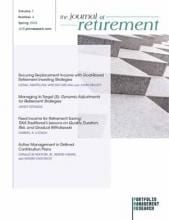
Securing Replacement Income with Goal-Based Retirement Investing Strategies
Written on 06 Jul 2020.

We are pleased to enclose an EDHEC-Risk Institute research article published in the Spring 2020 issue of the Journal of Retirement.
In this article "Securing Replacement Income with Goal-Based Retirement Investing Strategies", authors Lionel Martellini, Vincent Milhau and John Mulvey introduce goal-based investing strategies that avoid losses in retirement income greater than a fixed cap, but have the upside potential needed to achieve higher levels of income than what would be possible without taking any risk.
TOPICS: Retirement, pension funds, wealth management
KEY FINDINGS
• Goal-based investing principles can be used to create retirement solutions that secure a minimum level of replacement income while delivering a high probability of reaching higher levels defined as aspirational goals.
• These “flexicure” retirement solutions use a dedicated safe portfolio, known as a retirement goal-hedging bond portfolio (or retirement bond in short), which is a fixed-income portfolio whose cash flows (or factor exposures) match those of the stream of replacement income for a fixed period of time, say 20 years, in retirement.
• Such strategies use liquid building blocks, they reliably secure a clearly identified replacement income goal without requiring ad hoc parametric assumptions, and they offer upside potential; as such they represent an attractive alternative to existing retirement products such as annuities or target date funds.
Lionel Martellini is a professor of finance at EDHEC Business School and the director of EDHEC-Risk Institute. He is a former member of the faculty at the Marshall School of Business, University of Southern California, and he has also taught at UC Berkeley and Princeton University. He is a member of the editorial boards of The Journal of Portfolio Management, The Journal of Alternative Investments, and The Journal of Retirement. He conducts active research on a broad range of topics related to investment solutions for individual and institutional investors, equity and fixed-income portfolio construction, risk management, and derivatives valuation. He holds several Master’s degrees as well as a PhD in finance from the Haas School of Business, University of California at Berkeley.
Vincent Milhau is the Research Director at EDHEC-Risk Institute, where he is currently responsible for overseeing projects related to goal-based investing and investment solutions, with a particular focus on retirement investing. He joined the organisation in 2006 and has worked on a number of asset allocation projects for institutional and individual investors. These have included asset-liability management for defined-benefit pension funds, life-cycle investing, target date funds and goal-based investing for individuals, long-term investing under short-term constraints and factor strategies. He has also contributed to the Institute’s research on portfolio construction in the equity and the fixed-income universes. He has co-authored articles that have appeared in international finance journals. He earned a master’s degree in statistics and economics and a PhD in business studies from the University of Nice-Sophia Antipolis.
John Mulvey is a professor of operations research and financial engineering at Princeton University and a founding member of the Bendheim Center for Finance in Princeton, NJ. Professor Mulvey is a leading expert on large-scale optimization models and algorithms, especially financial applications. He has implemented integrated risk management for many large financial companies, including American Express, Towers Perrin/Tillinghast, Pacific Mutual, and St. Paul Insurance. His recent work involves the area of alternative investments (hedge funds, private equity, venture capital, and commodities), their relationship to traditional assets, and dynamic investment strategies to enhance performance.

